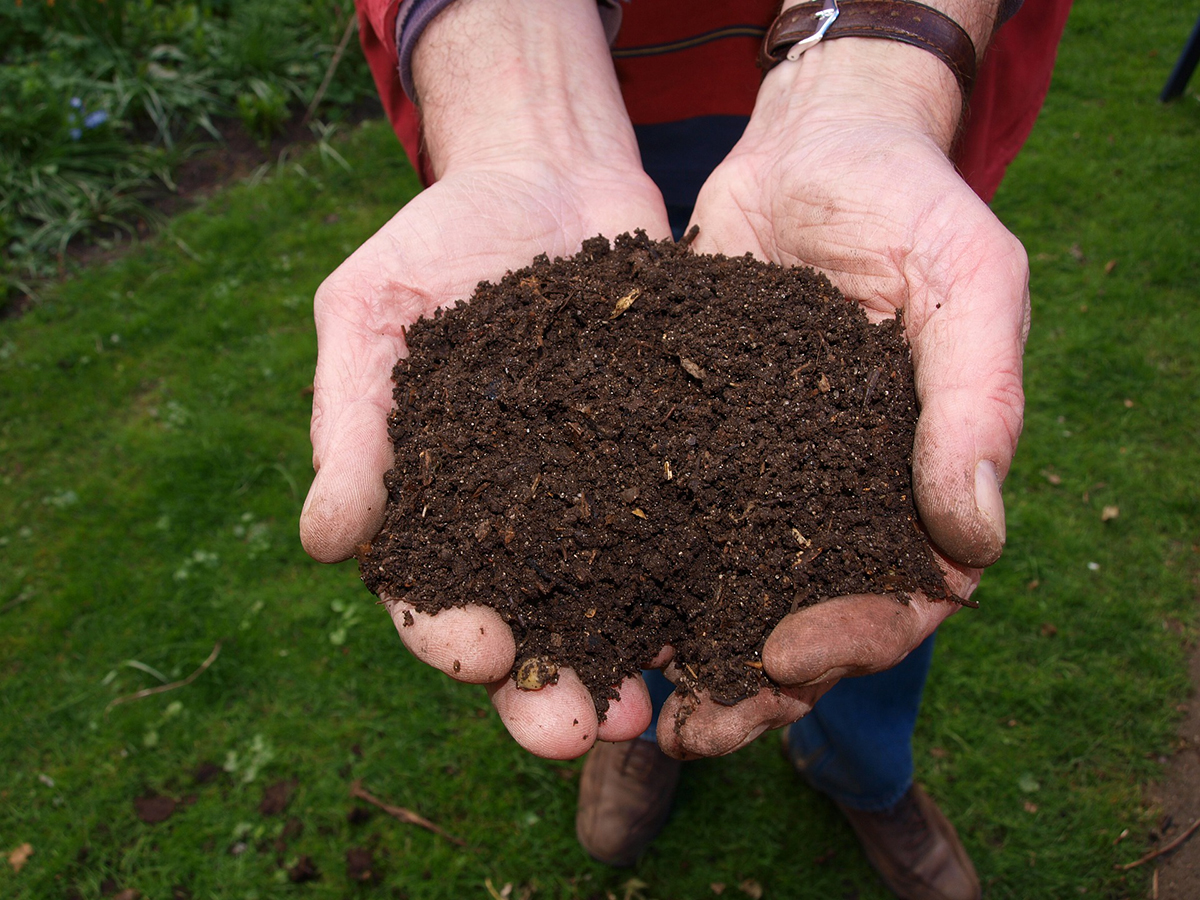
By Sarah Browning, Extension Educator in Lancaster County
It won’t be long before leaves are falling and gardeners will have an abundance of organic matter. Why not put these materials to good use this fall and start a home compost pile? Composting is easier than you think and the finished compost is an excellent soil amendment to improve the growth and health of your garden or landscape plants.
Here are six quick answers to common composting questions to help you get your compost pile off to a good start.
MY COMPOST DOESN’T BREAK DOWN. WHAT AM I DOING WRONG? Your materials are probably too dry. Microorganisms in the compost pile require nitrogen, phosphorus, potassium, oxygen and water to live, grow and reproduce, transforming your garden waste into compost. Nitrogen, phosphorus and potassium are supplied through the materials you add to the pile.
Water should be added to the pile during construction and each time it is turned. Ideally, the pile is moist but not soggy, releasing one or two drops of water when a handful of compost materials are squeezed. Since we haven’t received any rain lately, add water to existing compost piles to keep the microorganisms happily working away.
Compost piles also need turning every two or three weeks to maintain good oxygen supply and ensure the fastest decomposition.
CAN COFFEE GROUNDS BE COMPOSTED? Yes, coffee grounds are a high-nitrogen material, with a 20:1 carbon:nitrogen ratio. Some gardeners think coffee grounds will make their compost and soil too acidic, but this is not true. The pH of decomposing coffee grounds is not constant and can range from slightly acidic to mildly alkaline. However, ideally, your compost pile should not consist of more than 20% coffee grounds. Having a diverse group of materials as a food source for decomposing microorganisms is a better strategy.
CAN EGGSHELLS BE COMPOSTED? Yes, eggshells will break down in the compost pile, but they do not contribute either large amounts of nitrogen or carbon to the finished compost. Eggshells are primarily made of calcium. Typically, Nebraska soils already have good levels of calcium, but adding your eggshells to the compost pile is still fine. Some gardeners may be concerned about the possibility of salmonella bacteria contaminating their compost pile or garden from eggshells. Hot composting, where the materials in the pile reach 140–160°F, will kill salmonella bacteria.
CAN I PUT WOOD ASHES IN MY COMPOST PILE? Wood ash is approximately 25% calcium carbonate, a common liming product, which is highly soluble in water. This means adding large amounts of wood ash can quickly raise the pH balance of your compost pile out of the optimum range and cause a decline in microbial activity. Use wood ash sparingly in the compost pile, particularly since most soils in eastern Nebraska already have a higher pH level. Compost microorganisms function best in a neutral to acidic soil pH range of 5.5–8.
ARE COMPOST ADDITIVES, INOCULANTS OR ACTIVATORS A GOOD IDEA? Compost additives are made up of dormant soil microorganisms, but although microorganisms are essential for breaking down your organic materials, you don’t need to buy them. There are high populations of microorganisms in native soil and finished compost, as well as on food scraps, tree leaves, grass clippings, etc. There’s no need for you to purchase them.
When using the layering technique of building a compost pile, a 1-inch layer of soil or finished compost is mixed with layers of high-carbon and high-nitrogen materials. This provides all the microorganisms a compost pile needs for materials to break down well. For more specifics on creating a compost pile using the layering technique, refer to Nebraska Extension NebGuide “Garden Compost” (G2222) at https://go.unl.edu/gardencompost.
HOW CAN YOU TELL WHEN THE COMPOST IS FINISHED? Finished compost is dark brown, crumbly and earthy-smelling. There will not be any recognizable pieces of the original materials and the pile will not heat up any longer when remixed.
ATTEND A COMPOSTING DEMONSTRATION
For more information on creating a traditional compost pile, plan to attend one of this year’s composting demonstrations, presented by Nebraska Extension Master Gardeners at Pioneer’s Park Nature Center.
• Saturday Aug. 21, 10–11 a.m.
• Saturday Sept. 4, 10–11 a.m.
• Saturday Oct. 23, 10–11 a.m.
FOR MORE INFORMATION
To find more information on composting, see Nebraska Extension NebGuide “Garden Compost” (G2222) at https://go.unl.edu/gardencompost.